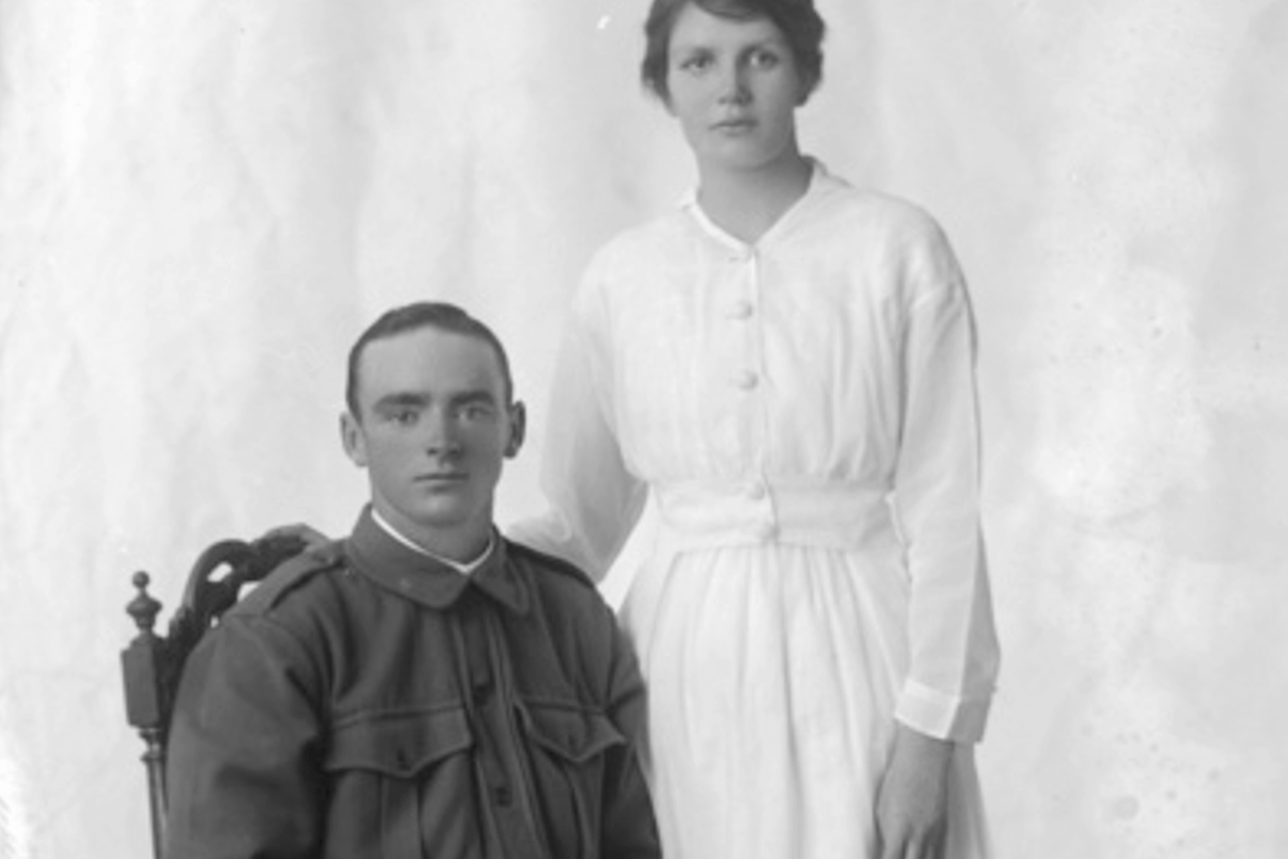General News
3 August, 2024
Veterans' Voices: Reuben Hunter Hinkley
- Sally Bertram, RSL Military History Library. Contact Sally at sj.bertram@hotmail.com or call 0409 351 940.

Reuben Hunter Hinkley was born on March 24 1891 in Edenhope.
His father, William Wilford Hinkley, was 43 and his mother, Sarah Ann Hunter, was 35.
Reuben was the 12th child of 16 born to the couple.
The family had moved to Ashby Farm, Gnowangerup, via Broomhill Great Southern Railway in Western Australia.
Reuben was a farmer before enlisting in World War I.
He was married to Maisie Hinkley (née Brown) and listed her as his next of kin.
Her address was "Hinkley, care of Mrs Paterson, 8 Clive Street, West Perth, WA".
However, Reuben’s father was named as his next of kin in one of his prisoner-of-war records from Germany.
Reuben did not have previous military service before enlisting.
Reuben enlisted in March 1916 at Blackboy Hill, WA.
He was 24 years and 10 months of age.
His service number was 6128 and he was a private.
His unit on enlistment was 19th Reinforcements 16 Battalion.
On enlistment Reuben was at No 55 Depot, from where he was transferred to 28th Reinforcements 14 Battalion.
Reuben embarked in Fremantle on August 7 1916 and sailed on OC Troopship Miltiades, disembarking in Plymouth on September 25.
After completing further training in the United Kingdom, Reuben proceeded overseas from Folkestone to France aboard SS Princess Clementine to join a reinforcement unit on December 21 1916.
Reuben was marched in to 4 ADBD from Training Battalion England, then from 4 ADBD he was marched out to his unit on December 31 1916 at Etaples, France.
On January 21 1917 he was taken on strength in the field.
Reuben went missing on April 11 1917 and was reported missing in France on April 17.
It was stated in a letter from Reuben sent through a Mrs M Ochiltree of 19 Beaumont Street, Lanchester, England, that he was a prisoner of war captured in Reincourt, France, and that he was interned in Z3605 Soltau Camp, Hannover, Germany.
A prisoner of war report from 3rd Echelon, France, stated that Reuben was a prisoner of war in Germany.
Although an initial report from the prison camp said Reuben had no wounds, he had in fact been hit by a machine gun bullet to the calf of one leg.
Reuben was also reported to have been interned at Muster (Lager) on May 12 1917 and at Linburg Camp on July 17 1917.
A report in the form of a telegram from Ripon on January 3 1919 said Reuben had been repatriated and had arrived back in England on December 30 1918.
Reuben was due to report to Headquarters on January 2 1919.
He was granted extended leave to February 2 1919.
On January 25 1919 he was serving at No2 Command Depot.
He was later marched to Administration Headquarters.
Reuben was repatriated to Australia from Portland, England, on either March 3 or April 30 1919 on HT Euripides, disembarking in Fremantle on April 10 1919.
On board with him was Martin Hy Adams of Minyip.
On July 21 or 24 1919 Reuben was discharged at 5th Military District in Perth as "unfit" due to his wound.
The was a note on his service record mentioning Tingary, a stationary training ship for young navy recruits (like cadets) who could join the navy when they were old enough to qualify.
Reuben must have had a passing connection to this training ship.
Reuben received the 1914 Star, the British War Medal and the Victory Medal.
He died in the Perth suburb Scarborough, WA, on November 30 1966, at the age of 75 and was buried at plot number KA 0329 in the Anglican section of Karrakatta Cemetery & Crematorium, WA.
Reuben’s name is commemorated on Ballarat Australian Ex-Prisoner of War Memorial
Prison camps
The prison camps in which Reuben was contained as a prisoner of war came under X Army Corp (Hanover) and under Mannschftslager (Enlisted Men's Camp) for private soldiers and NCOs.
They included Münster, where there were four camps: Münster I outside the city in open farming country, Münster II at the racecourse (Rennbahn), Münster III a former army barracks and Münster IV reserved for Russian prisoners.
Munster Camp opened in 1914 near Soltau on Lüneburg Heath.
Another camp was holding 12,000 men.
Soltau camp held 35,000 men but had 50,000 assigned to work camps.
This was where Reuben first went after being captured.
With thanks: Sally Bertram, RSL Military History Library.
Contact Sally at sj.bertram@hotmail.com or call 0409 351 940.